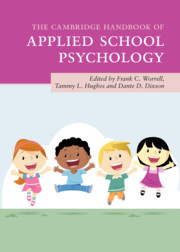Book contents
- The Cambridge Handbook of Applied School Psychology
- The Cambridge Handbook of Applied School Psychology
- Copyright page
- Contents
- Contributors
- Contributor Biographies
- Acknowledgments
- 1 Broadening the Focus of School Psychology Practice
- Part I Individual-Level Academic Interventions
- Part II Teacher- and System-Level Interventions
- Part III Interventions from Educational and Social/Personality Psychology
- 10 Belonging in Schools: A Social Psychological Perspective
- 11 Cross-Race/Ethnic Friendships in School
- 12 Self-Regulated Learning in School Contexts
- 13 School Environments that Facilitate Delaying Gratification
- 14 Understanding and Cultivating Hope in School
- 15 School Settings that Facilitate High Teacher Expectations
- 16 Parental Autonomy and Relatedness Support
- 17 Preventing and Minimizing Stereotype Threat in School Settings
- 18 The Hidden Classroom: How Gender Stereotypes Impact Academic Achievement
- Part IV Behavioral and Social-Emotional Interventions
- Part V Health and Pediatric Interventions
- Part VI Family Connections and Life Transitions
- Part VII Special Populations
- Part VIII Conclusion
- Index
- References
12 - Self-Regulated Learning in School Contexts
from Part III - Interventions from Educational and Social/Personality Psychology
Published online by Cambridge University Press: 18 September 2020
- The Cambridge Handbook of Applied School Psychology
- The Cambridge Handbook of Applied School Psychology
- Copyright page
- Contents
- Contributors
- Contributor Biographies
- Acknowledgments
- 1 Broadening the Focus of School Psychology Practice
- Part I Individual-Level Academic Interventions
- Part II Teacher- and System-Level Interventions
- Part III Interventions from Educational and Social/Personality Psychology
- 10 Belonging in Schools: A Social Psychological Perspective
- 11 Cross-Race/Ethnic Friendships in School
- 12 Self-Regulated Learning in School Contexts
- 13 School Environments that Facilitate Delaying Gratification
- 14 Understanding and Cultivating Hope in School
- 15 School Settings that Facilitate High Teacher Expectations
- 16 Parental Autonomy and Relatedness Support
- 17 Preventing and Minimizing Stereotype Threat in School Settings
- 18 The Hidden Classroom: How Gender Stereotypes Impact Academic Achievement
- Part IV Behavioral and Social-Emotional Interventions
- Part V Health and Pediatric Interventions
- Part VI Family Connections and Life Transitions
- Part VII Special Populations
- Part VIII Conclusion
- Index
- References
Summary
Self-regulated learning (SRL) involves a system of cyclically related, goal-directed skills and processes that students can use to overcome academic challenges and to optimize their success in school. Although there are many complex models of SRL, the purpose of this chapter is to distill key themes among prominent SRL theories and to provide practical guidelines for incorporating SRL principles into classroom instruction or direct service activities with students. In this chapter, we describe how students can be taught to engage in a cyclical process of SRL involving the use of metacognitive skills (i.e., setting goals, planning, and evaluating), strategic thinking and action, and adaptive motivational beliefs. The authors also illustrate how educators can support SRL skills by fostering a supportive learning environment encompassing five key principles (e.g., helping students set clear and relevant goals, talking in the language of strategies) and/or by implementing established school-based SRL intervention programs. The characteristics of a SRL intervention program, called the Self-Regulation Empowerment Program (SREP), concrete SRL case scenarios, and supplemental resources are also emphasized.
Keywords
- Type
- Chapter
- Information
- The Cambridge Handbook of Applied School Psychology , pp. 194 - 212Publisher: Cambridge University PressPrint publication year: 2020



